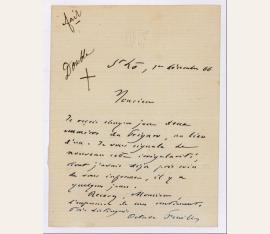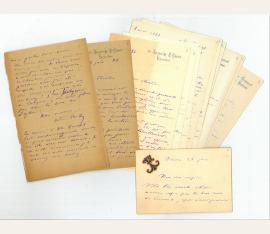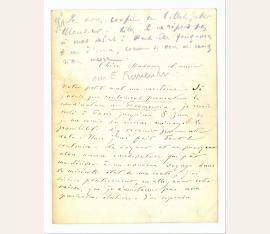écrivain (1821-1890). Lettre autographe signée. Saint Lo. 01.12.1866. 1p in-8. À son chiffre OF en tête.
$ 85 / 80 €
(45028/BN31100)
Double à l'identique d'une lettre adressée au Figaro pour signaler à nouveau qu'il en reçoit deux exemplaires chaque jour. Lettre anciennement collée. - Joint une C.D.V. de Madame Octave Feuillet pour remercier son correspondant [Charles Vincens?] pour son chagrin suite à un décès [de son mari?]. - Ancienne collection Charles Vincens.
Schriftsteller (1821-1890). Eigenh. Albumblatt mit U. O. O. u. D. ½ S. 8vo.
$ 85 / 80 €
(936784/BN936784)
Vier Zeilen in französischer Sprache mit Widmung an einen Monsieur Cohn. - Octave Feuillet, Verfasser von Dramen und zumeist konservativen Gesellschaftsromanen, war 1862 Mitglied der Académie française geworden. - Mit kleinen Montagespuren.
novelist and playwright (1821-1890). 11 autograph letters signed, 1 autograph correspondence card signed, and 1 autograph visiting card. Paris, Versailles, Divonne, and no place. 8vo, oblong 12mo and visiting card format. Together 22 pp. on 3 bifolia and 11 single sheets.
$ 532 / 500 €
(82902/BN54272)
Mainly to the writer and theatre director Jules Arsène Arnaud Claretie (1840-1913) regarding performances and the cast of his comedy "Chamillac". - Suggesting to schedule the play no more often than three times a week so as to ensure its revival next fall, mentioning Claretie's last letter in which he appeared somewhat cross after Feuillet decided to put matters regarding the play into the hands of the actor Benoît Constant Coquelin (1841-1909) before leaving Paris for Vittel on doctors' orders: "Je crois que le moment est venu en effet de ménager la pièce comme vous me le dises en ne la jouant que trois fois par semaine, dans l'intérêt de la reprise par laquelle vous voulez bien m'informer à compter pour la rentrée d'automne.
Dans votre lettre précédente vous paraissez un peu froissé qu'avant de quitter Paris j'eusse recommandé mes intérêts à Coquelin [...] Je vais partir dans cinq ou six jours pour Vittel où les médecins m'envoient [...]" (Versailles, 4 June 1886). - Regarding changes of staff that the actor Gustave Worms (1836-1910) has accepted with great composure: "J'ai fait ma démarche personnelle auprès de Worms et il m'a conformé une acceptation avec une parfaite bonne grâce [...]" (Versailles, 2 Nov. 1886). - Grateful for Claretie's promise to revive "Chamillac" with Gustave Worms in the title role the following autumn, mentioning another play he is working on and his need to revise certain parts thereof: "J'enregistre avec plaisir et gratitude votre brave promesse de me reprendre Chamillac avec Worms à la rentrée d'automne. Je n'ai pris aucun engagement pour la pièce intime dont je vous ai parlé. J'ai d'ailleurs besoin d'en retravailler certaines parties qui ne me satisfont pas [...]" (Versailles, 10 June 1887). - About the actress Julia Bartet's (1854-1941) reply to his letter asking for her agreement before disposing of her role as Madame de Tryas, looking forward to seeing Maria Legault's (1858-1905) debut in "Chamillac": "J'ai cru devoir écrire à Mlle Bartet et prendre son agrément avant de disposer de son rôle. Mais sa réponse n'est pas douteuse, et dès à présent la question relative à Mlle Legault me parait tranchée. Je serais très heureux de la voir débuter dans mon pièce [...]" (Versailles, 17 Sept. 1887). - To Claretie or another theatre director, surprised that he plans to stage "Chamillac" only a single time the following week, which would stifle a reprise, suspecting he intends to end their friendly relations: "On m'a avoué hier au Théâtre que votre intention était de ne donner Chamillac qu'une fois dans la semaine qui commence. J'ai vraiment peine à le croire. Ce serait visiblement étouffer une reprise dont le succès ne peut être contasté [...] Je ne pourrais me l'expliquer qu'en vous supposant quelque raison de vouloir mettre fin à nos relations amicales [...]" (Paris, 8 April 1888). - The correspondence card to a colleague with thanks for praise; the visiting card with thanks for a friend's sympathy. - All letters on stationery with embossed address; the correspondence card with embossed monogram; the visiting card on mourning paper. All with traces of former mounting on verso. Two portraits of Feuillet from the Félix Potin collections (such as were offered with Félix Potin chocolate bars between 1898 and 1922 as "contemporary celebreties"), as well as two brief newspaper clippings listing his works, mounted on a single sheet of paper, are loosely enclosed..
French novelist and playwright (1821-1890). 2 autograph letters signed. [Saint-Lô. 12mo. Together 5 pp. on bifolia.
$ 532 / 500 €
(91563/BN60884)
Interesting set of letters that were forwarded by the unidentified female recipient to the painter and writer Eugène Fromentin in connection with Fromentin's unsuccessful candidacy for the Académie française in 1876. - In the first letter, Feuillet responds to a request on Fromentin's behalf, informing the recipient that he will not be able to take part in the vote despite his support of the candidacy: "Your little note dismays me. Had I only been able to foresee Fromentin's candidacy, I would have stayed in Paris until June 8, or at least allowed myself the possibility of returning for that date.
In fact, I did just the opposite. Seeing and foreseeing no candidacy that could make me decide again to travel in my miserable state of health, I declared positively, citing this reason, that I would not attend the next elections [...]. He knows, do not doubt it, what not only sympathetic but passionate taste I have for his double worth. You can be sure that he has seen it in my eyes, and felt it in my hand - he is a much finer man than you think. If he is nominated, I will be as happy as if I had had a hand in it [...]". - The recipient forwarded this letter to Fromentin with the words, "I entrust you with this letter, dear Sir; alas, it does not answer to my desires! Perhaps you would do well to write as if you knew nothing yet". Fromentin heeded this advice but, as he did not indicate his address, Feuillet sent his response to the mutual friend, now asking her directly to forward it to Fromentin, which she did with the following words: "This is the second letter that I have just received. Little hope from this side". Feuillet expresses his deep regret, again citing to his ill health as his reason for not returning to Paris: "Fromentin writes me, but he does not give me his address. I am therefore forced to send you my reply, asking you to read it, close it, put the address on it with a three-ecu stamp, and have the whole thing thrown into the letterbox. Your friend writes me a perfectly kind and discreet letter, the sadness of which I can nevertheless feel. I am painfully affected by it, for I really do love him very much, and I make no secret of the fact that the most sincere feelings seem suspect when they are not acted upon. But I am suffering in truth, and unable again to embark any time soon on a journey that I had to divide into three stages when I retured from Paris". - Eugène Fromentin lost the vote on 8 June 1876 to Charles Blanc and died suddenly on 27 August 1876 in La Rochelle. - Minor stains..



